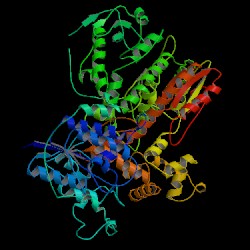Polymerase
|
|
A polymerase (EC 2.7.7.6/7/19/48/49) is an enzyme whose central function is associated with polymers of nucleic acids such as RNA and DNA. The most well known function of a polymerase is the catalysis of production of new DNA or RNA from an existing DNA or RNA template, a process known as polymerization. It is an accident of history that the enzymes and organelles responsible for the catalytic production of other biopolymers are not also referred to as polymerases.
One particular polymerase, that from the thermophilic archae, Thermus aquaticus (Taq, pronounce "tack") (PDB 1BGX (http://www.rcsb.org/pdb/cgi/explore.cgi?pid=288631034363198&pdbId=1BGX), EC 2.7.7.7) is of vital commercial importance due to its use in the polymerase chain reaction, a widely used technique of molecular biology.
Other well known polymerases include:
Terminal Deoxynucleotidyl Transferase (TdT), which lends diversity to antibody heavy chains.
Reverse Transcriptase, which has both an RNA dependant DNA polymerase activity and a DNA dependant DNA polymerase activity. It is also a major drug design target.

